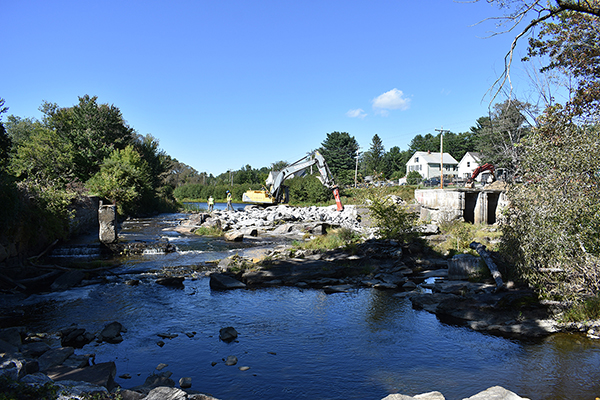
The following press releases is being posted on behalf of the US Fish and Wildlife Service.
LISBON, ME — The U.S. Fish and Wildlife Service, in partnership with the Maine Department of Marine Resources (DMR), the Atlantic Salmon Federation and other partners, today broke ground on a restoration effort funded by President Biden’s Bipartisan Infrastructure Law that will remove two dams on the Sabattus River, restore habitat for fish and wildlife, increase public safety, and reduce flood risk for communities around Lisbon and Sabattus, Maine.
Through a $38 million investment in the Service’s National Fish Passage Program this year, the Bipartisan Infrastructure Law is bolstering efforts to address outdated, unsafe or obsolete dams, culverts and other barriers to our nation’s rivers and streams for the benefit of people and wildlife.
“I am thrilled to join this important day for the local community and for our national investment in conservation, recreation and public safety,” said Winnie Stachelberg, Department of the Interior Senior Advisor and Infrastructure Coordinator. “The Upper Town Dam removal is one of the first Bipartisan Infrastructure Law-funded projects from the National Fish Passage Program to break ground. This project will reduce flood risk upstream of the dam, decrease risk of catastrophic failure and impacts to neighboring infrastructure, and improve aesthetics and recreational opportunities for the community.”
“The removal of these dams will result in many benefits not only for the local community but also for the ecosystem of this important watershed,” said Maine DMR Commissioner Patrick Keliher. “I’m excited to celebrate the start of this project with the many partners who’ve been instrumental in its success.”
“We are thrilled to be able to support this important dam removal project on the Sabattus River,” said John Burrows, Executive Director of U.S. Operations for the Atlantic Salmon Federation. “Completion of this project will not only be a huge step forward for sea-run fisheries restoration in the Sabattus, but it will also address long-standing public safety and infrastructure issues for the Town of Lisbon.”
Today’s groundbreaking ceremony at the Upper Town Dam in Lisbon highlighted the project, which will remove the Upper Town Dam and the Mill Remnant Dam and restore and revegetate adjacent riverbanks. Removing these two unstable dams will eliminate public safety hazards, reduce flooding risk, and improve access to nature and recreation opportunities for neighboring communities. The project was made possible in part by $350,000 in Bipartisan Infrastructure Law funding through the U.S Fish and Wildlife’s National Fish Passage Program. An additional $300,000 came from Atlantic Salmon Federation, Maine Department of Marine Resources, the National Fish and Wildlife Foundation National Coastal Resilience Fund, and partners.
Removing these dams in combination with other restoration projects will benefit wildlife by improving aquatic habitat and opening fish passage in the Androscoggin watershed. Restoration of the Sabattus River is expected to result in 2,429 acres of lake and pond habitat and 75 miles of river and stream habitat becoming accessible to alewife, blueback herring, American shad, federally endangered Atlantic salmon, and American eel, which need to migrate between fresh and saltwater to complete their lifecycles. Once access is restored, a self-sustaining run of nearly 500,000 adult alewife from Sabattus Pond could return to the Androscoggin Watershed each year.
The Service’s National Fish Passage Program supports aquatic ecosystem restoration projects and restores free-flowing waters, allowing for enhanced fish migration. These projects also help mitigate the effects of climate change by removing or bypassing natural and man-made barriers that could be problematic during flooding events.
These projects will help support the America the Beautiful initiative to conserve, connect and restore our nation’s lands, waters and wildlife.
The mission of the U.S. Fish and Wildlife Service is working with others to conserve, protect, and enhance fish, wildlife, plants, and their habitats for the continuing benefit of the American people. For more information on our work and the people who make it happen, visit www.fws.gov. Connect with our Facebook page at www.facebook.com/usfwsnortheast, follow us on Twitter at www.twitter.com/usfwsnortheast, watch our YouTube Channel at http://www.youtube.com/usfws and download photos from our Flickr page at http://www.flickr.com/photos/usfwsnortheast.